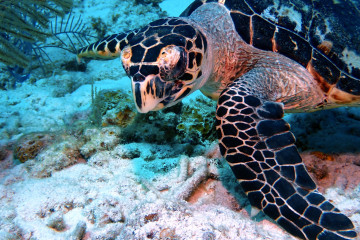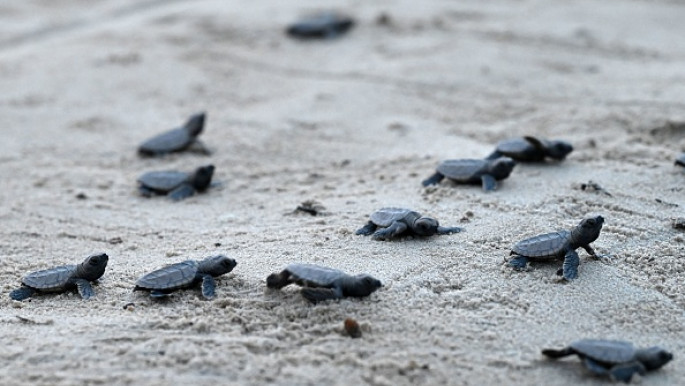

Despite efforts by the Environmental Studies Center (ESC) at Qatar University to protect hawksbill turtles from extinction via the "Sea Turtle Protection Project" which started in 2003, these turtles are still endangered.
Thierry Lesales, chairman of the Qatar Natural History Group recalls a trip he organised a few months ago where dozens of children had the chance to watch hawksbill turtle eggs hatching. The trip took place as part of the sea turtles protection project, on the Fuwairit public beach, which has closed annually since 2018 during the turtles' nesting season.
Seaside education
Lesales smiles as he remembers the children's excitement at seeing the baby hawksbill turtles clambering along the seashore during the annual hatching period, which lasts from early June until late July. He points out that the International Union for Conservation of Nature (IUCN) ranked this kind of turtle as an endangered species in 1982 (a designation which worsened to "critically endangered" in 1996).
"Sea turtles are endangered due to overfishing, climate change, and the pollution of nesting sites on beaches due to the development of coastal tourism and the increase in beach camping"
Lesales says over 100 people, including many children, learned about why saving the hawksbill turtle is important, during 12 educational visits to the hatching sites, organised in collaboration with the Qatar Museums Authority. He added: "People were so grateful for this experience, which allowed them to connect with local marine life."
Hawksbill turtles: Plummeting population
Between 2014 and 2020 the number of live sea turtles in Qatar dropped by 57 percent. This was accompanied by a 44 percent reduction in the number of turtle nests according to Qatar's Planning and Statistics Authority (PSA).
Sea turtles are endangered due to overfishing, climate change, and the pollution of nesting sites on beaches due to the development of coastal tourism and the increase in beach camping, which confuses their nesting plans, said Dr Jassim Al-Khayat, executive director of the turtle protection project.
|
|
Positively, PSA data indicates that since the decision was made to close Fuwairit Beach to protect sea turtles during their nesting and hatching seasons, the number of live hatching turtles has increased by 47 percent, and the number of nests has increased by 37 percent.
Protecting the turtles on nature reserves
Al-Khayat explained that the turtle protection project has established nature reserves on various Qatari beaches to safeguard turtle nests. It also monitors the release of baby turtles into the sea, as well as tracks their movement via satellites in order to count the number which survives.
"The sea turtles face many dangers from industrial and urban development, which is causing erosion of the Qatari coast, as well as cars being driven on beaches and the increase in plastic pollution. The sea turtles also face the danger of accidental suffocation in fishing nets, and getting caught up in the plastic rubbish strewn across the beaches and floating in the water."
"The turtle protection project has established nature reserves in various Qatari beaches to safeguard turtle nests. It also monitors the release of baby turtles into the sea, as well as tracking their movement via satellites"
Pollution confuses turtles' natural instincts
He states that "the turtles instinctively return to their place of birth to lay their eggs, but environmental contamination is leading to changes in the chemical composition of the beach sand, so the turtles don't recognise the place they were born, which forces them to change where they lay their eggs.
"The huge drop in the number of turtles and nests [according to the data] can be traced to errors in previous data collection methods – in the past data collection was done by people who weren't trained in handling the nests, and people who had no experience would think that any hollow on the beach contained turtle eggs. Moreover, incorrect methods of collecting eggs would sometimes kill the embryos inside. We consider post-2018 statistics as more accurately indicating the situation of sea turtles in Qatar because they have been documented by people who had training."
Ministry of Municipalities & Environment confirms its keenness to take all measures to protect the Endangered hawksbill turtles, explaining that its decision to close Fuwairit Beach from the April 1 to August 1 is to protect endangered sea turtles during the nesting season. #QNA pic.twitter.com/5yCZSaku8S
— Qatar News Agency (@QNAEnglish) April 27, 2019
However, despite the 90 percent success rate in live hatching of eggs recorded in 2020, according to the PSA, the rate of survival was worryingly low: for every 100 eggs laid, only around one baby turtle might ultimately survive. There are many reasons for this, like the many dangers facing the turtles on the beaches, as well as the fact that they are viewed as prey by other animals, especially crows.
Altered sex ratios
Experts warn that by the year 2100, there is a danger that most hawksbill turtles – the breed that dominates the sea turtle population in Qatar – born on the Qatari coastline will be female. This is because the breed has temperature-dependent sex determination (TSD), where warmer temperatures lead to more female turtles - so as the planet's temperature rises, a decreasing male population is a real risk.
Scientists predict that the expected feminisation of sea turtle chicks in Qatar will mean nesting areas will require males to be brought in to preserve the species from extinction, regardless of the success rate in the hatching process.
The Associate Professor of Marine Sciences at Qatar University, Radhouan Ben Hamadou, says: "Climate change is affecting the biological systems of sea turtles, which also increases their risk of extinction, because climate change increases the carbon dioxide levels in the water, raising its acidity. This makes the outer layers of the eggshell, and of the turtle's shell [once born], too fragile to protect them."
He adds that the rise in the sea temperature also leads to changes in the turtles' natural habitats, which leads them to move, which can endanger them too. This is especially the case when a new spot which is suitable temperature-wise carries other risks like urban encroachment on the beaches.
Human behaviour imposes huge pressures on nature, he says, so "marine life isn't threatened simply by climate change, but because of environmental pressures added to human encroachment, which compromises the ability of animals to adapt to the environmental changes, and so to survive."
"The extinction of any creature in a marine environment exposes the marine eco-system to risk of collapse as a result of leaving it unbalanced – the eco-system is unable to adapt to the loss of any one of its elements"
Warding off ecological collapse
Ben Hamadou stresses the need to protect sea turtles from extinction: "The extinction of any creature in a marine environment exposes the marine eco-system to the risk of collapse as a result of leaving it unbalanced – the eco-system is unable to adapt to the loss of any one of its elements."
Al-Khayat says: "The turtle protection project's mission is to support their ability to survive, as sea turtles are still endangered despite all the efforts made, and we need more awareness of the importance of the environment, and the role of beach visitors in taking responsibility for protecting the turtles through not littering their environment. This could be done by organising visits to the nesting spots."
Lesales ends with: "Watching the sea turtles is wonderful, and everyone who has experienced this is so happy to see the baby turtles moving on the sand towards the water. It helps them to appreciate the importance that these hatchlings survive and are able to return to their place of birth later. We try to convince everyone who comes on these trips how urgent it is we protect sea turtles from extinction, and most people understand their role, and practice it later."
This is an edited translation from our Arabic edition with additional reporting. To read the original article click here.
Translated by Rose Chacko
This article is taken from our Arabic sister publication, Al-Araby Al Jadeed and mirrors the source's original editorial guidelines and reporting policies. Any requests for correction or comment will be forwarded to the original authors and editors.
Have questions or comments? Email us at: info@alaraby.co.uk





 Follow the Middle East's top stories in English at The New Arab on Google News
Follow the Middle East's top stories in English at The New Arab on Google News


